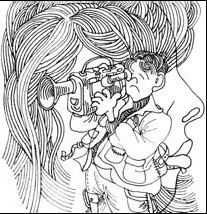Li Xing
Hey, media - Stop female stereotyping
By Li Xing (China Daily)
Updated: 2007-03-08 07:01
 |
Large Medium Small |
"Four women stir the US with the public unable to take them all in," a headline from a major Chinese news website was flaring across the screen a few weeks ago.
In the short commentary, the writer described how the media busied themselves chasing after one American woman after another as they made news.
 The four have been none other than Hillary Clinton, who became the first woman in US history to run for president; NASA astronaut Lisa Nowak, who is facing attempted kidnapping charges; Anna Nicole Smith, a statuesque model and 1993 Playboy Playmate of the Year, who died a mysterious death in the middle of long-drawn out legal battles for inheritance; and Drew Gilpin Faust, the celebrated historian who became the first female president of Harvard University since its founding in 1636.
The four have been none other than Hillary Clinton, who became the first woman in US history to run for president; NASA astronaut Lisa Nowak, who is facing attempted kidnapping charges; Anna Nicole Smith, a statuesque model and 1993 Playboy Playmate of the Year, who died a mysterious death in the middle of long-drawn out legal battles for inheritance; and Drew Gilpin Faust, the celebrated historian who became the first female president of Harvard University since its founding in 1636.
According to the online writer, the different fates of the four women demonstrate two sides of American society. On the one hand, the US is now mature enough to accept women in high political and academic echelons; but on the other, the country's heavily economic plus social development may not "naturally promote the development and progress of women".
I think the writer made a good point and her viewpoint also applies to developing societies, such as China. But I still have misgivings about putting them all together with such a sensational banner headline.
My misgivings may be out of sync with the trendy media, except that Drew Faust, Hillary Clinton, Lisa Nowak and Anna Nicole Smith have been newsmakers for years, and it is only natural that their rise or fall hit the headlines.
Deep down, I think my misgivings come from the traditional Chinese stereotypical divide of "good" women vs "bad" women. It is not acceptable to me when the "good" and the "bad" are thrown together, especially when a "good" role model such as a female astronaut has fallen.
Besides, the good-vs-bad traditional stereotype concerning women dies hard in Chinese society.
For instance, the media, willingly or unwillingly, have been emphasizing the traditional stereotype that women's place is at home.
Chinese journalists are more likely to ask successful career women how they balance their profession with their family life than professional men. Without having the women talk about their guilty feelings about their families, the women do not seem complete.
Somehow, Drew Faust may have been spared the question, even though Hillary Clinton showed her cooking skills during her husband's presidency.
That women's place is at home is also reflected in the slogan "Today's girl, tomorrow's mother" promoting the "Spring Buds" project to help girls from poverty-stricken rural families return to school.
The most highlighted benefit to send a girl to school is that she will become educated and then give birth to and bring up healthy children.
In sharp contrast, UNICEF promotes the idea of "Today's girl, tomorrow's woman".
As researcher Bu Wei repeatedly points out, a girl should enjoy the same rights as a boy in education and development. This is a question of human rights, not a question of motherhood.
According to media reports, even Drew Faust "was raised to be a rich man's wife". But she rebelled and is now the president of "the most powerful university in the world".
We are often reminded that it will take a long time to change centuries-old stereotypes, but the media, which set social trends, should take action to change the social stereotypes by giving up the traditional concept of women.
E-mail: lixing@chinadaily.com.cn
(China Daily 03/08/2007 page9)
| 分享按钮 |